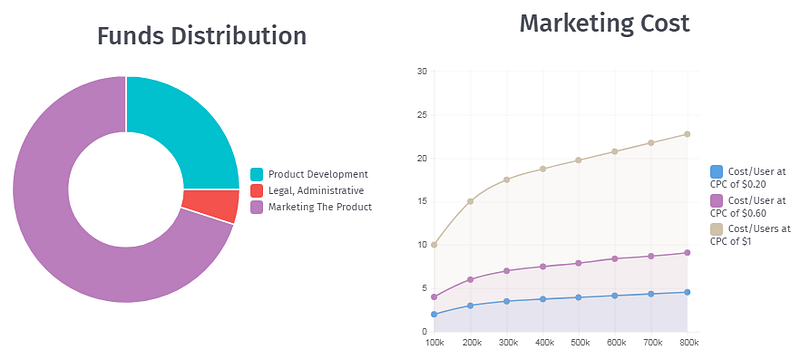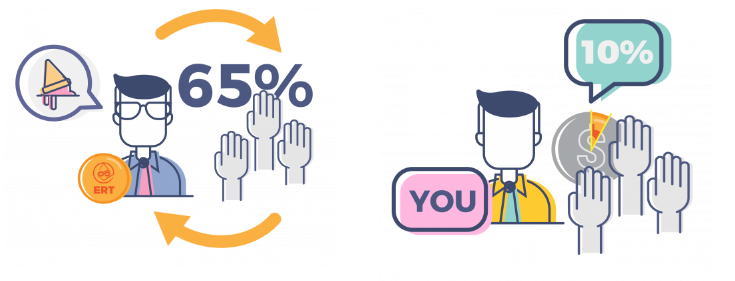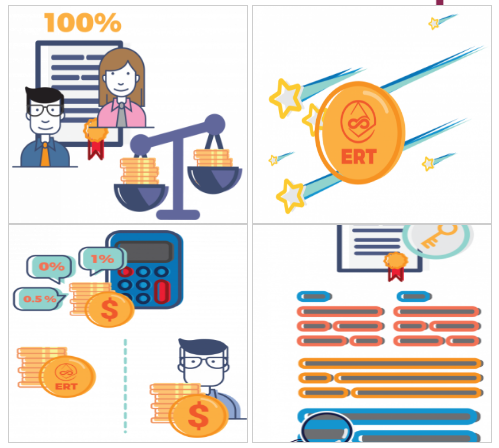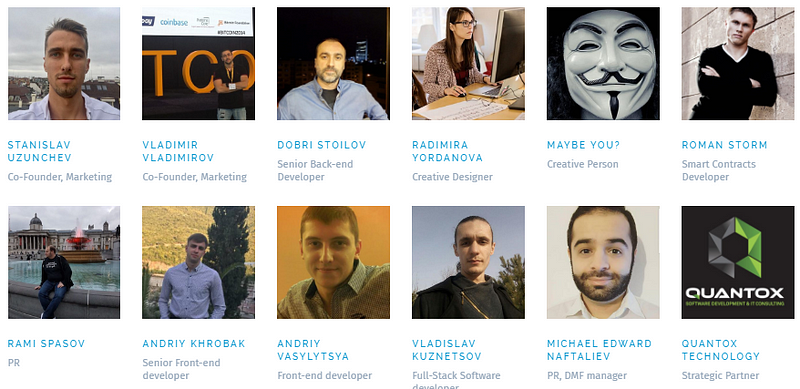1. Details of ICO
ICO 2.0, independent and hierarchical, AI. Democracy No profit A bill of 0% to 1% is returned to the system to coordinate the initiatives of all stakeholders.Other actual projects, in fact, are not decentralized. Communities (all ERT owners) can choose and make decisions. Other projects we see are centered by hosting or grouping. The only part involved in chaining is the intellectual, and not so sophisticated contract to exploit the full potential of this technology. The system we provide is self-sufficient and self-regulated. He can grow independently, without us, and we do not make a profit vector for us. We make a profit, like other token owners.
We also found that only a few AI-based projects, we intend to have millions of users on the platform, and this should really develop and be self-sufficient. We will use OpenAI in search engines and other Ethearnal functions .

ICO will begin on 28 February 2018 and end on March 31, 2018. During the ICO, up to 30,000,000 Ethereal cards (ERT) account for 75 %% of ERT’s total supply. During this time, a hard 30,000 ETH lid has been installed.
+ Hard Cap is 30,000 ETH
+ Soft cap is decided by participants, since they can initiate refund process if they deem the raised funds are insufficient.
+ 1 Ether gets you 1000 ERT. Or the price per 1 ERT is 0.001 Ether
+ 1000 ERC-20 ERT tokens are generated for every 1 Ether sent. Total token supply depends on that.
+ ICO starts at 28th February and ends at 31th March.
+ Maximum possible total token supply: 40,000,000ERT
+ Quorum needed for starting voting process: 51%
+ Votes needed to release next round of funding: 51%
+ % of the funds to be released after voting in our favour: 10%
+ Votes needed to get the raised funds refunded: 65%
2. Ethearnal is the first ICO 2.0
2.1 The token holders remain in control of the team spending!Only 10% of the collected funds are released to us upon completion of the ICO. The other 90% and the founders’ tokens remain locked in the smart contract. We keep the community constantly updated on our progress, when we need more funds released we initiate a voting process.
Every token holder can vote proportionally to his tokens by sending a simple transaction to the smart contract, if we should get another round of funding. If 51% vote no, we don’t get anything and continue working until the token holders are satisfied enough to vote yes the next time we initiate a voting process. Our smart contracts are public and everyone with the skills can verify the above.

2.2 Every token holder can start a refund process
At any time, anyone holding at least 1 ERT token can initiate a refund voting process by sending a transaction to our smart contract. If 65% of the tokens vote for a refund all remaining funds are refunded proportionally.
So, at any time, we are in possession of only 10% of the funding and if we stop delivering on our promises, you can get back the rest of your investment.
Everything we do is open source and easy to monitor. We already have minimum viable product developed with our own funding.
2.3 Dynamic hourly ICO cap.
During the first hour of our ICO, the smart contract accepts maximum of 1 ether per person. Every transaction above 1 ether will not be accepted. The second hour that cap is increased to 2 ether and so on every hour until the end of the ICO.This makes it inefficient to have a huge gas fee to make your transaction go first and out place the smaller participants. And if for some reason your transaction didn’t get through you have a new chance every hour! That way, a whale must compete with thousands of regular participants every hour, leveling the playing field as much as possible (not bulletproof though), without an invasive and bureaucratic onboarding process.
3. Why do you use Ethearnal token

+ 100% trustless, smart contract based!
Code is law. All agreements are set in stone via the magic of trustless, self-enforcing Ethereum smart contracts. All parties have reputation at stake. The contract value is in escrow. Only if needed, a pool of moderators with a reputation at stake step in and decide by simple majority vote. Game theory logic aligns the initiatives of all parties involved.
+ Tokenized reputation!
We collide reputation and economic initiative into one by tokenizing reputation and giving it value. Your reputation is worth real money, can be bought, sold or transferred. You stake some of it when entering a contract. The more reputation you have, more visible you are in the network and can participate in bigger projects. It’s up to the offer creator to set how much reputation he wants at stake, but it’s to be expected that bigger projects will require more reputation at stake. Reputation is called Ethearnal Reputation Token or ERT and is what we are selling in our ICO.
+ Zero fees go back to the developers!
Depending on the case, 0%, 0.5% or 1% is charged by the network, but none goes back as profit to the developers. Everything is used back in the system to align the economic initiatives of everyone involved, including the token holders! Depending on the case, those fees are used to buy reputation (ERT) tokens on the free market and awarded to the contract participants or distributed to the token holders in ether directly. We replace centralized, profit taking sites with self-sufficient technology and pass the savings to you.
+ Decentralized arbitrage by simple majority vote!
When there is a dispute, a pool of moderators aligns to solve it. They have a reputation at stake, as well, and game theory-based initiative to judge honestly. Every token holder can be a moderator and earn by solving disputes.
+ Freelancing is $1.5 Trillion industry ripe for dirsuption!
The freelancing industry is estimated to be worth over $1.5 trillion dollars in 2016. While this number is impressive, the trend is to go even higher at faster rates. Most freelance sites charge 10%-20%, and up to 30% in very rare cases. Most of that goes to support their hefty centralized infrastructure and staff, and a huge portion of it goes as profits in the pockets of few.
We finally have the means to replace them with technology and return the meaning of “free” in freelancer. The great thing about decentralized technology is that, once built, it can be made self-sufficient and doesn’t require salary or profit.
4. How does it work?
Freelancers can create listings presenting their services and push them on the network using a web client. On the backend, we use IPFS (interplanetary file system) to keep and distribute their listings on a peer-to-peer basis. No servers needed. They don’t have to keep their web client online; the offers just live in the cloud.Employers can search all of the listings from the same web client, or publish their own offers searchable by the freelancers.
The employer has the contract value locked in smart contract-based escrow.
Pre-agreed amount of reputation tokens are staked from each side. Each listing has a predefined amount of reputation tokens that needs to be staked in order to enter into smart contrac based agreement with. The listing creator sets that value. Both sides have to stake the same amount. The side taking the listing needs to accept that condition and stake the required amount of reputation tokens.
Predefined timeframe upon which if none of the following outcomes have been met, it self-releases everything back. That is just a safeguard to prevent funds from being indefinitely locked.
Ethearnal reputation tokens (ert) can be earned in two ways:
Directly buying them on the free market. That way, anyone can start right away and avoid the egg and chicken problem of new freelancers who need reputation to get contracts, but need contracts to get reputation.
Taking jobs on the network and being rewarded reputation tokens upon successful completion.
In both cases, the participants have invested valuable resources (e.g. time or money) to gain that reputation, so it is valuable to them, and thus, they have initiative to keep it. Even if they don’t appreciate their time, the reputation token has monetary value on the free market.
The creator of the listing, being a gig or job offer, decides how much reputation stake to require for entering into a smart contract. So, he has the freedom to decide based on the overall contract value and his personal risk assessment.
There are 3 possible outcomes of this smart contract:
+ Outcome 1: both parties are happy
They execute the contract on their own, no 3rd party intervention is needed.
both are awarded reputa- tion tokens proportional to the contract value.
+ Outcome 2: at least one part is unhappy
A pool of moderators steps in and decides in favor of one of the sides based on sim-ple majority vote.
+ Outcome 3: they are no longer willing to work together
The contract thus self-closes after preset amount of time and returns everything in escrow and at stake.
5. Team

More Infomation
Website: https://ethearnal.com
Whitepage: https://ethearnal.com/ethearnal-whitepaper.pdf
ANN: https://bitcointalk.org/index.php?topic=2628593.0l
Telegram: https://t.me/Ethearnal
Facebook: https://www.facebook.com/ethearnal/
Twitter: https://twitter.com/ethearnal_com
— — — — — — — — — — — +++ — — — — — — — — — -
Author
Bitcointalk: https://bitcointalk.org/index.php?action=profile;u=1814424
My ETH: 0x8c66F87585e002BF91e9E9c8247471f71c44DD6f


